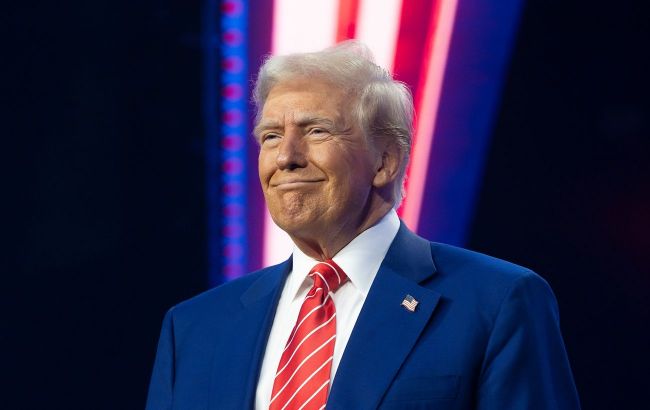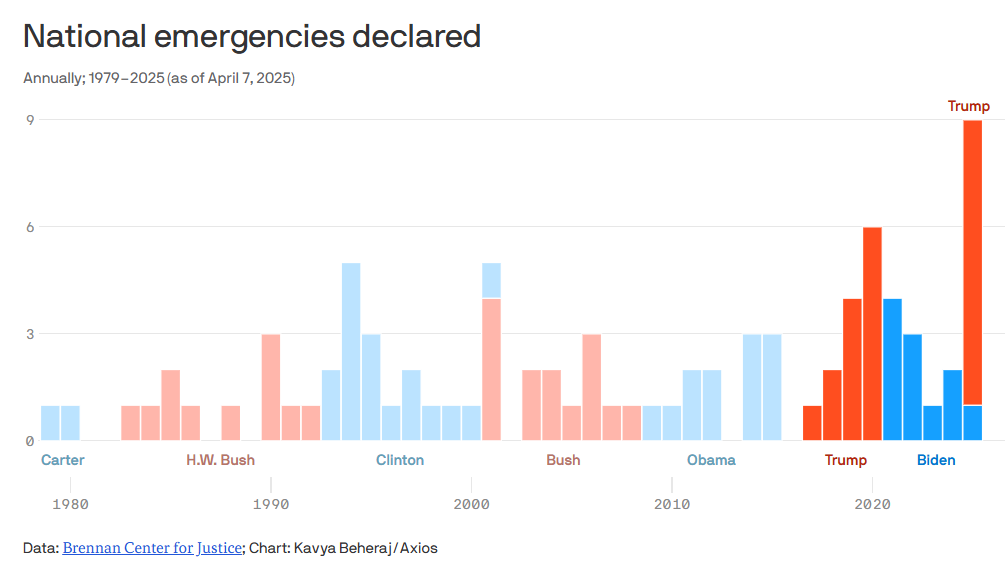Trump declares more states of emergency than anyone else
 Donald Trump, President of the US (photo: Getty Images)
Donald Trump, President of the US (photo: Getty Images)
In less than 100 days, US President Donald Trump has declared more national emergencies than any other head of state in modern American history, according to Axios.
According to the US outlet, Trump has effectively set a new record.
Powers originally intended to grant the US president flexibility in rare moments of crisis have become a cornerstone of the incumbent’s agenda, Axios writes, allowing him to sidestep Congress and issue unilateral directives during the first three months of his presidency.
Recently, Trump invoked national emergencies to:
- impose the highest tariffs in a century;
- accelerate energy and mineral production;
- and militarize federal lands on the southern border (near Mexico).
Combined with his "attack" on the judicial system, legal scholars fear that Trump is using loosely written statutes to try to shift the constitutional balance of power, according to a report by Axios.

How it works
The US president can declare a state of emergency at any time, for almost any reason, without needing to prove a specific threat or obtain approval from Congress.
The National Emergencies Act of 1976, which unlocks more than 120 special legislative powers, originally included a legislative veto that allowed Congress to end a state of emergency by a simple majority vote.
However, in 1983, the US Supreme Court ruled that the legislative veto was unconstitutional. This effectively stripped Congress of its original oversight, making it much harder to rein in presidential emergency declarations, Axios notes.
Since then, American presidents have mostly relied on “norms” and “self-restraint” to avoid abusing emergency powers for non-crisis situations, explained Elizabeth Goitein, senior director of the Liberty and National Security Program at the Brennan Center.
That precedent was broken in 2019, she added, when Trump declared a national emergency to bypass Congress and obtain billions of dollars in funding to build the border wall.
Former US President Joe Biden also expanded his powers, drawing criticism in 2022 for invoking a national emergency due to COVID-19 to unilaterally forgive student loan debt.
At the same time, Trump’s actions during a potential second term would plunge the US decisively into uncharted territory, writes Axios. This has reshaped the boundaries of executive power in real time and intensified concerns about a state of permanent emergency.
Increasing scale of threats
In justifying his tariffs, Trump cited the International Emergency Economic Powers Act (IEEPA), which can only be used if the US faces an unusual and extraordinary threat to its national security, foreign policy, or economy.
The White House has argued that for decades, US trade relations - even with small countries and uninhabited islands - can be considered such threats.
As a result, the 1977 law, originally designed to counter hostile foreign states and never before used to impose tariffs, is now being deployed to rewrite the global economic order, Axios reports.
White House spokesman Harrison Fields stated that difficult times demand a serious response, and the previous administration left President Trump a nation in decline, financially vulnerable, with unsecured borders and dangerously unfair trade agreements.
The White House representative adds that President Trump is using all the tools provided by the Constitution to make America great again.
Axios also points out that Trump’s commitment to emergency powers goes beyond the National Emergencies Act.
For example, he invoked the 1798 Alien Enemies Act during wartime to deport Venezuelan migrants.
Recently, the ACLU expressed concerns over Trump’s flirting with the 1807 Insurrection Act, which would allow him to deploy National Guard troops within the US without state approval.
“You would hope to see authorities like these used sparingly and reluctantly, as the last resort in an actual crisis situation, because they are a real departure from the constitutional norm,” Goitein says in a comment to Axios.
By the way, it’s not only the current US president who is credited with breaking records in American politics.
Recently, Democratic Senator Cory Booker delivered a speech lasting more than 25 hours, during which he harshly criticized Trump for harming the country’s democratic institutions. He broke the record for the longest continuous speech, which was previously held by segregationist Senator Strom Thurmond (since 1957).

